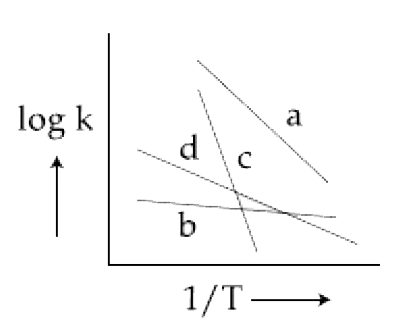Define the following :
(i) Order of reaction
(ii) Activation energy of reaction
(i) It may be defined as the sum of exponents of the concentraiton tem in the rate Law expression.
(ii) It may be defined as the extra amount of energy over and above the average energy of reactants which must be supplied to them to undergoe a chemcial reaction
(i) Rate =−12d[B]dt=12×1×10−2=0.5×10−2mol|L|S
(ii) Rate = −12d[A]dt=−12d[B]dt=+13d[c]dt
Rate of change in concentration of A,
−d[A]dt=−12d[B]dt=0.5×10−2mol−1|L|S
Rate of change in concentration of C
+d[C]dt=−32d[B]dt=35×10−2=1.5×10−2mol|L|S
Topper's Solved these Questions
- BOOK - XII BOARD PREVIOUS YEAR PAPER ENGLISHCHAPTER - XII BOARDSEXERCISE - Set I31videos
XII BOARDS
- BOOK - XII BOARD PREVIOUS YEAR PAPER ENGLISHCHAPTER - XII BOARDSEXERCISE - Set II10videos
XII BOARDS
- BOOK - XII BOARD PREVIOUS YEAR PAPER ENGLISHCHAPTER - XII BOARDSEXERCISE - Questions29videos
XII BOARDS
- BOOK - XII BOARD PREVIOUS YEAR PAPER ENGLISHCHAPTER - SAMPLE PAPER 2019EXERCISE - SECTION: D1videos
SAMPLE PAPER 2019
Similar Questions
Activation energy of the reaction is :
View SolutionDefine " Order of a reaction" and " Activation energy of a reaction " .
View SolutionDefine activation energy of a reaction.
View SolutionDefine activation energy of a reaction.
View SolutionDefine activation energy of a reaction.
View Solution(a) Explain the following terms :
(i) Order of a reaction
(ii) Molecularity of a reaction
(b) The rate of a reaction increases four times when the temperature changes from 300 K to 320 K. Calculate the energy of activation of the reaction, assuming that it does not change with temperature. (R=8.314JK−1mol−1)View SolutionDefine each of the following :
(i) Specific rate of a reaction.
(ii) Energy of activition of a reactionView SolutionWrite the reactions involved in the following :
(i) Etard reaction , (ii) Stephen's reductionView SolutionConsider the following plots of rate constant versus 1T for four different reactions. Which of the following orders is correct for the activation energies of these reactions ?
 View Solution
View SolutionCan activation energy for reactions be zero?
View Solution

